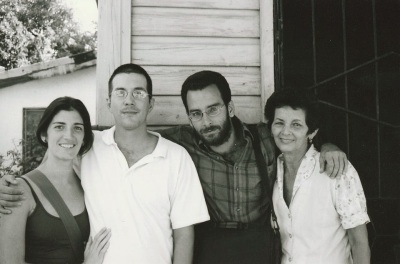We started university. It was Havana 1991.
One afternoon we went to sit in the stands at the university stadium. We had no desire to remain in the classroom.
At times we knew biochemistry as science-fiction, in a Biology Department where there wasn’t even distilled water.
Professors and students deserted en masse, when they could get any kind of little scholarship to study abroad. Those of us left behind, they expelled us as soon as we dared to voice an opinion. The climate was one of immeasurable cruelty. I was never sadder than when I was a Cuban student, poor and happy and with the permanent look of our indolence before so much pain. For me Castroism is this. A wasteland where healthcare and education are free, but human life is not given.
That afternoon we passed through the Calixto Garcia Hospital. When we passed the emergency room a gentleman approached me. Not the group, but he came straight to me. He was wearing a suit and tie in the summer of that Cuba in the midst of the Special Period. He grabbed me by both arms and said,
“How old are you?”
My friends reacted somewhat violently. Including my girlfriend of the time. Girlfriends are always girlfriends of the time.
They separated him from me.
But I had seen something in that sudden scene. I went to where the group had pushed the gentleman. I grabbed him by his arms.
“I’m 19,” and even gave him some more details, “I’ll be 20 in December.”
The he hugged me. Strong, deep, feeling. He smelled too strong, deep, feeling. And broke into tears on my shoulder. On my collar, my neck, on my hair which had started to look long at the beginning of the decade and the end of the millennium.
“I knew it, your same age,” he said with a voice cracked with tears. “And it almost killed me inside. I just left him dead on the same stretcher in which we brought him yesterday. Go and ask his forgiveness for me. I don’t want my son to know that his father had to see him like this.”
And he released me as abruptly as he had come.
And started walking toward the Philology Department, an oasis of Ficus or laurels or whatever they call those trees that preceded and will survive the Revolution.
I can barely remember wow the exact works of that dialog. But this final phrase was syllable by syllable, this:
I don’t want my son to know that his father had to see him like this.
Nor do I.
I don’t want Cuba to know that we had to see her like this. Horrible, hateful, hypocritical, hollow.
I left. We left.
That afternoon we didn’t go to the university stadium.
That afternoon the friends and girlfriends of that time, in that band of barbaric biochemists, we each went to our own homes to never return to our country.
For some if took us almost a quarter of a century, as in my case. Others didn’t even graduate from the university, to simplify the paperwork and the harsh bribes. Most ended up “betraying” the country as soon as the country “located” them in a high technology center of the Council of State, from where they could travel to a meeting in Europe or the USA.
We disbanded as a group. As fellow travelers of our biographies and our hearts.
I and my girlfriend (in that order) went to the nearest Route 23 bus stop, in a deserted park at 25th and N. I gave her a big kiss on the lips. I loved her so much. But it was, of course, a kiss of farewell.
I decided to return to the hospital. I went for the dead son of the gentleman in suit and tie, who recognized me as his I-don’t-know-what in the midst of a tragedy as personal as it is collective. I always return for the death of my loved ones.
In the emergency room, with the filth of the police and the beggars, with its students caught between ignorance and incivility, there was no longer any dead son on any stretcher. For other reasons, I never again saw my girlfriend of that time. Nor our Cuba of that time.
Today the climate remains one of immeasurable cruelty. The sadness didn’t let us save ourselves from totalitarianism. We are, each one of us, the Castro regime itself. And especially now, when hope is a poor and happy whore, paid by the exiled dance of millions, those who erased death by death the memory of our indolence faced with so much pain.
12 February 2015

